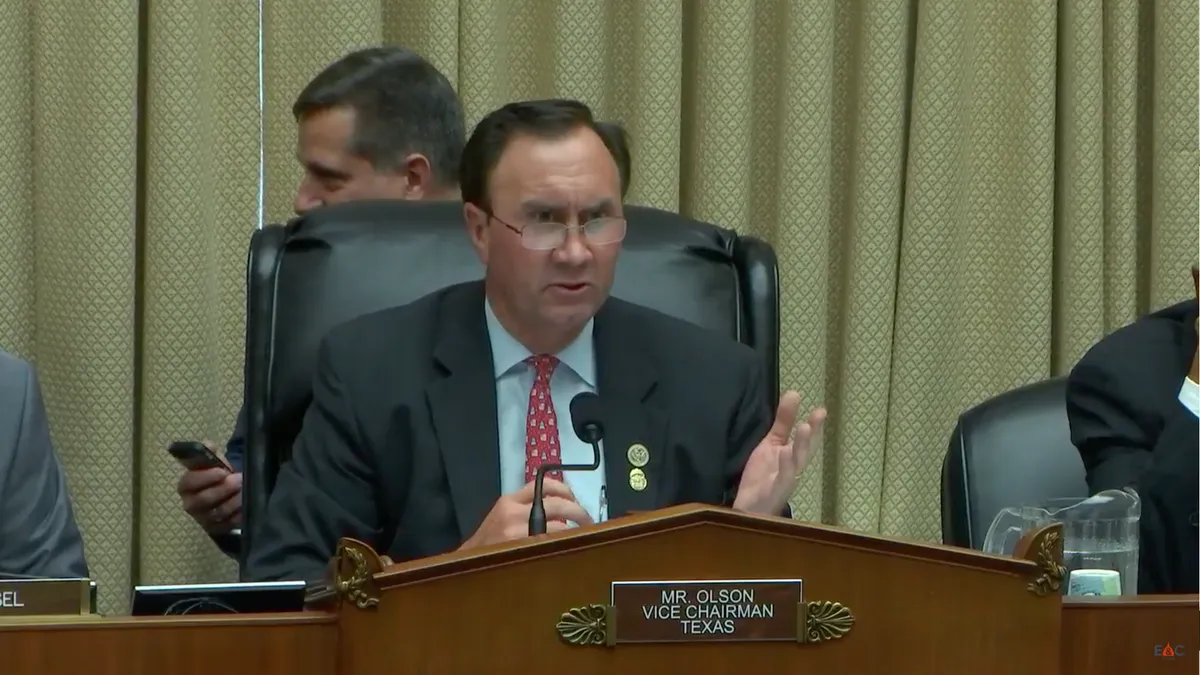Dive Brief:
- The bipartisan leadership of a House Energy and Commerce subcommittee filed comments with the Federal Energy Regulatory Commission (FERC) on Monday, urging it to extend its consideration of a controversial cost recovery proposal beyond the 60-day deadline requested by the Department of Energy (DOE).
- Reps. Pete Olson (R-TX) and Bobby Rush (D-IL), respectively the vice chairman and ranking member of the E&C energy subcommittee, wrote that the DOE's request "does not provide adequate time" to evaluate market implications and cost impacts on consumers. They pushed FERC to address the grid resilience issue through existing proceedings, rather than "to make a sweeping, top-down decision in the near term."
- A group of Democratic lawmakers also filed comments with FERC on Monday, linking grid resilience to climate change and urging FERC to reject the DOE proposal. Reply comments on the plan to provide cost recovery to coal and nuclear generators are due Nov. 9.
Dive Insight:
While former FERC regulators and a wide variety of energy interests have lined up to criticize the Department of Energy's cost recovery proposal in recent weeks, Congressional Republicans have largely stayed silent — at most calling for more collaboration between DOE and FERC in crafting the rule.
Houston's Pete Olson is an exception. Throughout the year, his energy subcommittee has overseen a series of hearings on the electric utility sector. After one at the beginning of October, he told reporters that the DOE's proposal was a "big challenge and a big change."
"I'm concerned because it appears to be picking winners and losers, and every time we do that, we hurt the consumer," Olson said. "We jack prices up."
Olson and Ranking Member Bobby Rush put their concerns into formal comments on Monday, writing that "the 60-day comment period requested by DOE does not provide adequate time to review and consider the market implications and the potential unintended effect of raising electricity costs."
"Given this, we ask you to continue addressing this matter through existing proceedings at the federal and regional level rather than quickly moving to make a sweeping, top-down decision in the near term," the lawmakers wrote. "If fixes are needed to ensure the reliability of the markets at just and reasonable rates, it is our hope that the Commission would do so in a deliberative and fair way that bears in mind that no resource is without flaws and that all provide a range of necessary attributes."
DOE issued its its Notice of Proposed Rulemaking (NOPR) in late September, proposing cost recovery for merchant generators that keep 90 days of fuel supplied onsite. Secretary of Energy Rick Perry argues the cost recovery is necessary to enhance the reliability and resilience of the grid, but a group of Democratic congressmen led by Rep. Jerry McNerney (CA) argue it would be "inappropriate and not adequate to the challenge."
"Actions to reduce carbon emissions are intimately linked with actions to increase resilience because reducing carbon emissions in the near-term can prevent the worst impacts of climate change in the future," the lawmakers wrote. "We are concerned that the Rule could reverse positive developments and deployment of low and zero-emitting sources and technologies and ignores the impacts that our transmission and distribution systems have on reliability and resiliency compared to fuel supply."
The Democratic lawmakers' comments echo recent findings that show grid infrastructure to be more susceptible to outages than generation in recent years. An Oct. 3 report from the Rhodium Group held that 0.00007% of the total customer outage hours between 2012 and 2016 were due to fuel supply issues — and most of those stemmed from a coal generator.
The NOPR gave FERC until Dec. 11 to respond, but Acting FERC Chairman Neil Chatterjee has said that action could take many forms, including rejecting the proposal or extending consideration. Two other FERC regulators — Commissioners Powelson and LaFleur — have indicated they likely will look for big changes in the NOPR, both pledging in recent weeks not to "blow up the markets" with any ruling.
How the newest additions to FERC will view the contentious proceeding remains an open question. Last week, the Senate confirmed energy lawyer Kevin McIntyre and Senate committee staffer Richard Glick by voice vote, filling the commission's five seats for the first time in two years.
In their nomination hearings, both regulators said they would support FERC's efforts to increase grid resilience, but pledged to keep the commission fuel-neutral and independent.
“The importance of [baseload] resources cannot be denied,” said McIntyre, who will become chairman once he takes his oath at FERC. “However, FERC is not an entity whose role includes choosing fuels for the generation of electricity. FERC’s role rather is to ensure that the markets for the electricity generated by those facilities proceed in accordance with law.”
Correction: This post has been updated to reflect that Rep. Olson is the vice chairman of the energy subcommittee, not the chairman.













